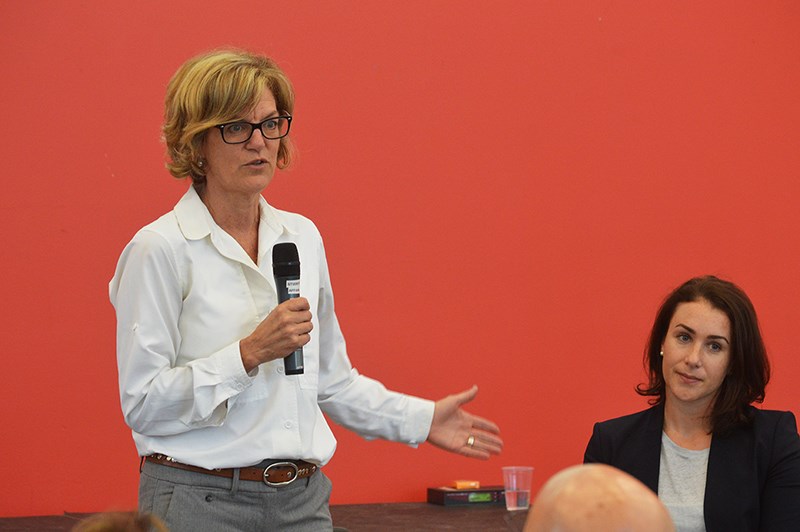Perhaps no surprise, liquefied natural gas (LNG) was on the minds of many at MP Pamela Goldsmith-Jones’s climate action policy roundtable Friday night.
It was by no means the only subject though for the approximately 75 people who had gathered at Quest University for a discussion on climate issues and how they fit alongside other concerns such as the economy and foreign policy.
Goldsmith-Jones opened the evening talking about Canada’s recent international emissions targets and how the issue is connected to Canada’s role in the world, especially with its North American trade partners.
“Canada’s foreign policy is very much one of engagement,” she said.
Goldsmith-Jones was joined by two panelists: communications expert James Glave and engineer Anna Stukas, who works with Carbon Engineering.
Glave focussed briefly on a few points for hope, such the growth of the clean energy sector and the fact that investment surpassed that in fossil fuels globally for the first time last year.
“This is now a very, very, very large business,” he said. “It’s more than doubled since 2015.”
Glave added that while the world is not yet turning “the curve downward” on carbon emissions, levels have plateaued, according to international energy agency experts.
Stukas spoke briefly about annual emissions from Squamish, which are measured at 88.538 tonnes of carbon dioxide. By comparison, her company hopes its pilot plant in Squamish can remove 100,000 tonnes a year, or enough to power half of the BC Transit fleet.
“We have an opportunity to be world leaders,” she said, adding, “We see an opportunity to decarbonize the transportation sector."
Still, from early on in the question period, several people had questions about the federal environmental assessment process that had approved the proposed Woodfibre project near Squamish earlier this year. Participants raised many of the same concerns that have arisen throughout the debate.
“This LNG discussion is very much about how we move forward,” said Brenda Broughton, a former mayor of Lions Bay and opponent of the Woodfibre project, adding there are 20 LNG projects on file in the province.
The LNG question was far from the only topic of discussion. Matt Blackman had questions around subsidies and why more subsidy money could not be diverted to renewable energy projects like his Alternative Energy Group in Squamish or retraining workers in the fossil fuel industries as opposed to heavily subsidizing projects like the Site C Dam in northern B.C.
Edith Tobe of the Squamish River Watershed Society commented on sea level issues as well as the need to protect natural, resilient parts of the environment that can capture carbon such as the Squamish Estuary.
“We’re fighting an uphill battle here is Squamish,” she said, adding that it was not fair for the federal government to expect local governments to fight these battles on their own.
Speaking as both a mom and a member of local government, Councillor Karen Elliott suggested the federal government should look for ways to involve young people in the discussion around environmental policy.
“Our youth have a lot to say about climate change and where they want their world to go,” she said.
Elliott also had questions around housing policy, saying smaller communities like Squamish need scalable solutions and that while they need to encourage green buildings, many in the community are simply struggling to find a place to live.
Over the course of a couple of hours, participants brought up a number of other topics, such as the need for area meetings on the proposed Kinder Morgan pipeline, a possible role for compressed natural gas (CNG) as a transitional fuel, the importance of smaller, more efficient homes and the need for wildfire strategies to prevent situations like the Fort McMurray fire or the recent Burns Bog fire, questions around liability in these cases and what effect these have on investment.
The MP, herself, was sympathetic to the issues raised, describing the LNG decision as a “tough” one. She also addressed the environmental assessment process, which she said her government is reviewing, along with other legislation such as the Fisheries Act, which she described as having been “gutted” by the previous government.
“We are behind the eight ball in many ways,” she said. “That’s what we inherited.”
Some members in the audience though suggested that if the process was not working, the federal government should not be processing assessment applications until it addresses the problem.
The meeting in Squamish was the first of several in the riding Goldsmith-Jones is holding during the summer break from Parliament to hear ideas on climate action from people in various communities.




